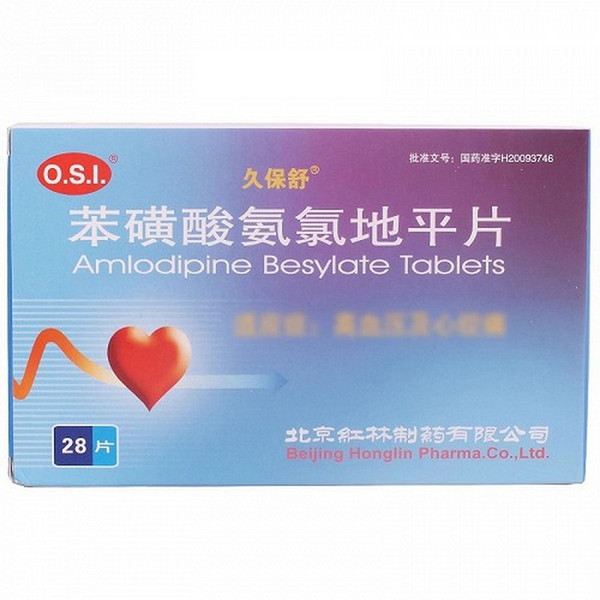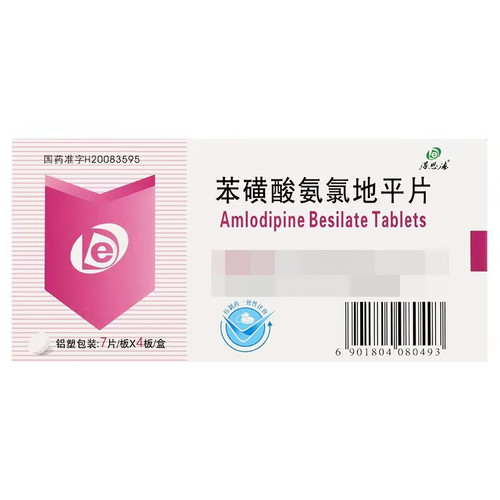Product Overview
[Drug Name]
Generic Name: Amlodipine Besylate Tablets
Trade Name: Jiubaoshu
English Name: Amlodipine Besylate Tablets
Chinese Pinyin: Benhuangsuan Anlüdiping Pian
[Ingredients]
The chemical name of this product is: 3-ethyl-5-methyl-2-(2-aminoethoxymethyl)-4-(2-chlorophenyl)-1,4-dihydro-6-methyl-3,5-pyridinedicarboxylate benzenesulfonate
[Appearance]
This product is a white tablet.
[Indications]
1. Hypertension. This product can be used alone or in combination with other antihypertensive drugs. 2. Chronic stable angina and variant angina. This product can be used alone or in combination with other antianginal drugs.
[Dosage and Administration]
The usual starting oral dose is 5 mg once daily, with a maximum of 10 mg once daily. For thin patients, frail patients, elderly patients, or patients with impaired liver function, the initial dose should be 2.5 mg once daily. Patients taking other antihypertensive medications should also begin with this dose. The dosage should be adjusted based on individual needs, and the adjustment period should be at least 7-14 days to allow the physician to fully assess the patient's response to the dose. However, more rapid adjustment can be performed if clinically warranted. The recommended dose for the treatment of angina pectoris is 5-10 mg; elderly patients or those with impaired liver function may require a reduced dose.
[Adverse Reactions]
Amlodipine is well tolerated. In placebo-controlled clinical trials for the treatment of hypertension or angina pectoris, the most common side effects were: Autonomic nervous system: flushing; General: fatigue; Cardiovascular, general: edema; Central and peripheral nervous system: dizziness, headache; Gastrointestinal: abdominal pain, nausea; Heart rate/rhythm: palpitations; Psychological: drowsiness. No significant clinical laboratory abnormalities associated with this drug were observed in these clinical trials.
[Contraindications]
This drug is contraindicated in patients with hypersensitivity to dihydropyridines or any of its components. [Precautions]
1. Angina and/or Myocardial Infarction: Rare. Patients with severe obstructive coronary artery disease may experience an increase in the frequency, duration, and/or severity of angina attacks, or the development of acute myocardial infarction, when initiating or increasing the dose of calcium channel blockers. The mechanism is unknown. 2. Hypotension: Due to the gradual onset of vasodilatory effects, acute hypotension is rarely seen with oral administration. However, caution is advised when using amlodipine besylate tablets in combination with other peripheral vasodilators, especially in patients with severe aortic stenosis. 3. Patients with Heart Failure: Calcium channel blockers should be used with caution in patients with heart failure. 4. Patients with Hepatic Insufficiency: This drug should be used with caution in patients with severe hepatic insufficiency. 5. Patients with Renal Failure: The starting dose can be maintained in patients with renal failure. 6. Discontinuation of β-blockers: Amlodipine besylate tablets do not protect against rebound symptoms associated with abrupt discontinuation of β-blockers. Therefore, discontinuation of β-blockers still requires a gradual dose reduction. 7. Amlodipine besylate tablets can be used safely in patients with obstructive pulmonary disease, well-compensated heart failure, peripheral vascular disease, diabetes, and lipid disorders.
[Use in Special Populations]
Precautions for Pediatric Use: Safety and efficacy in children have not been established.
Precautions for Pregnancy and Lactation: Research data on the use of this drug in pregnant women are lacking, but based on animal studies, this drug should only be used in pregnant women when absolutely necessary. It is unknown whether this drug is excreted in breast milk; breastfeeding women taking this drug should discontinue breastfeeding.
Precautions for the Elderly: Clinical studies have not demonstrated a difference in the response of the elderly compared to the younger population. However, given that the elderly often have impaired liver, kidney, and heart function, as well as other medical conditions and medications, the lower end of the initial dose range is generally used. Elderly individuals experience decreased clearance of this drug, with the area under the curve (AUC) increasing by approximately 40% to 60%, necessitating a lower initial dose. [Drug Interactions] Cimetidine, grapefruit juice, and acidogens: Coadministration does not alter the pharmacokinetics of this drug. Atorvastatin, digoxin, and ethanol: This drug does not affect their pharmacokinetics. Sildenafil: A single dose of sildenafil (Viagra) has no effect on the pharmacokinetics of this drug in patients with essential hypertension. The two drugs produce an independent antihypertensive effect when used together. Warfarin: This drug does not alter the prothrombin action time of warfarin. Digoxin, phenytoin, and warfarin: Coadministration with this drug has no effect on plasma protein binding. Anesthetics: Inhaled hydrocarbons may cause hypotension when used together with this drug. Nonsteroidal anti-inflammatory drugs: Indomethacin, in particular, may attenuate the antihypertensive effect of this drug. Beta-blockers: Coadministration with this drug is well tolerated but may cause excessive hypotension and, rarely, worsen heart failure. Estrogens: Coadministration may cause fluid retention and increase blood pressure. Sulfinpyrazone: Concomitant use may increase the protein binding of this drug, resulting in changes in blood concentrations. Lithium: Concomitant use may cause neurotoxicity, resulting in nausea, vomiting, diarrhea, ataxia, tremor, and/or numbness; caution is advised. Sympathomimetic amines: May weaken the antihypertensive effect of this drug. Sublingual nitroglycerin and long-acting nitrate preparations: Concomitant use with this drug may enhance the antianginal effect. Although rebound effects have not been reported, the dose should be gradually reduced under a physician's guidance when discontinuing this drug. Thiazide diuretics, ACE inhibitors, digoxin, warfarin, antibiotics, and oral hypoglycemic agents: Can be safely used with this drug.
[Pharmacological Actions]
Amlodipine is a calcium blocker (also known as a slow-channel blocker or calcium antagonist) that blocks the transmembrane entry of calcium ions into myocardial and vascular smooth muscle cells.
[Storage] Store in a dark, airtight container. [Strength] 5mg (as amlodipine)
[Packaging] 5mg x 14 tablets x 2 boxes
[Expiry Date] 36 months
[Approval Number] National Medicine Standard H20093746
[Manufacturer] Beijing Honglin Pharmaceutical Co., Ltd.








